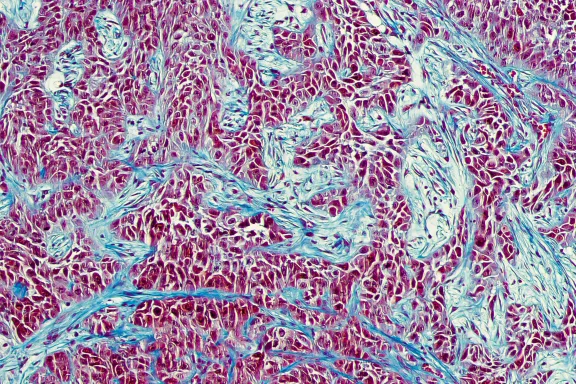Salvador Aznar Benitah Cancer and Aging: Dietary Fats Under Scrutiny
Salvador Aznar Benitah, researcher at the Catalan Institute for Research and Advanced Studies (ICREA), professor at the Biomedicine Research Institute (IRB) in Barcelona, Spain. ICREA's website
- 2020 • Liliane Bettencourt Prize for Life Sciences



Can cancer metastases be put on a diet? Salvador Aznar Benitah would like to find out. He has discovered that eating certain fats directly stimulates the formation of metastases. His work could advance therapeutic research in the fight against cancer.
Why do cancer cells colonise the human body?
Metastases are the cause of 93% of cancer-related deaths. But what exactly are we talking about? Metastases are proliferations of cancer cells outside their tissue of origin. When they escape, the cells attack other organs in the body. This 'colonisation' is extremely dreaded, as it is what leads to the spread of cancer and so many deaths. Determining how and why metastases form in the human body is essential in the fight against cancer. Finding precise answers to these questions could completely change the therapeutic approach adopted in the treatment of these cases.
Saturated fats, the guilty pleasure of metastatic cells
Salvador Aznar Benitah has established a direct relationship between the consumption of certain fats and the formation of metastases. By studying the behaviour of these cells, Salvador Aznar Benitah has shown that a diet too rich in saturated fats is a proven risk factor, not only for health but also for the progression of cancer. His work has enabled him to identify a protein marker that could play a role in fat absorption, and therefore have an impact on the proliferation of cancer cells. The researcher has thus demonstrated that a well-balanced diet not only helps to contain the progression of tumours, but also simply delays the ageing of cells.
The Foundation's support
In his laboratory, Salvador Aznar Benitah combines fundamental research in biochemistry with new technologies to develop innovative anti-metastatic therapies. The Liliane Bettencourt Prize for Life Sciences will enable him to further his research into the mechanism of metastases and the way in which diet affects their behaviour.
The researcher is convinced that beyond diet, new therapies aimed at blocking the entry of fatty acids into cells are possible. In addition to direct applications, he will continue his fundamental research to understand how cells coordinate, evolve and sometimes malfunction within the body.
Salvador Aznar Benitah in a few words
Salvador Aznar Benitah took an early interest in studying the behaviour of adult stem cells. He did his post-doctorate in Fiona Watt's laboratory at the Cancer Research Centre in London. In 2007, he set up his own laboratory at the Centre for Genomic Regulation in Barcelona and became Professor of Biomedicine in 2012. He has been group leader at the Barcelona Biomedicine Research Institute since 2013.
Salvador Aznar Benitah is an international reference for his work on molecular alterations in adult epidermal stem cells, which are responsible for ageing and certain cancers. He discovered that stem cells, regulated by a circadian rhythm, reprogramme themselves during life to cope with age-related disorders. The researcher also founded Ona Therapeutics. This biotechnology company develops therapies that target lipid metabolism. He is working on a process that will inhibit the cells that cause metastases, a major therapeutic challenge in the fight against cancer.
-
2003 PhD in Molecular Oncology, Autonomous University of Madrid (Spain)
-
2006 Post-doctorate in Professor Fiona Watt's laboratory at Cancer Research UK in London (United Kingdom)
-
2007 Junior group leader in the Stem Cell and Cancer Laboratory at the Centre for Genomic Regulation (CRG) in Barcelona (Spain)
-
2013 Senior group leader at the Institute for Research in Biomedicine (IRB) in Barcelona (Spain)
-
2018 ERC Advanced grant, European Research Council
-
2020 Liliane Bettencourt Prize for Life Sciences
Liliane Bettencourt Prize for Life Sciences
The Liliane Bettencourt Prize for Life Sciences rewards each year a researcher under the age of 45 for the excellence of their work and their remarkable contribution to their field of scientific research. This prize is awarded, depending on the year, to a researcher based in France or working in another European country. Thirty winners have been awarded since 1997. From 2023, prize rewards the laureate up to 100,000 euros.
All the award-winners






